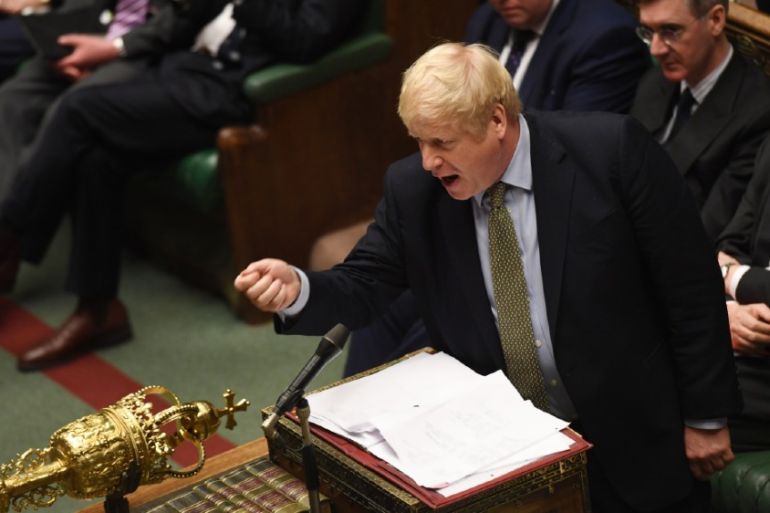UK Parliament approves Boris Johnson’s Brexit deal
UK prime minister succeeded where his predecessor repeatedly failed; getting Brexit legislation through Commons.

The United Kingdom now has one foot out of the European Union‘s door after Prime Minister Boris Johnson‘s Brexit Bill was endorsed by the House of Commons on Thursday.
Succeeding where his beleaguered predecessor, Theresa May, had repeatedly failed, the Conservative Party leader saw his EU-agreed framework for leaving the European body backed by 330 members of parliament with 231 opposed, paving the way for the country’s official departure on January 31.
Keep reading
list of 3 itemsUK’s Javid promises bigger budget in speech set for March 11
Can Africa really benefit from Brexit?
Speaking before the vote, Labour’s Paul Blomfield, opposition shadow minister for exiting the EU, lamented the bill’s inevitable passage, and particularly the Conservative government’s refusal on Wednesday to restore child refugee protection rights into the Brexit agreement.
In what he described as a “heartless move”, Blomfield said guarantees over the rights of unaccompanied child refugees to be reunited with family residing in the UK would not be included in the legislation.
Following his comprehensive general election victory last month, Johnson’s EU Withdrawal Agreement Bill faced little Commons opposition as it sidestepped the parliamentary impasse that had so dogged May’s administration.
|
|
“Johnson has taken a party and a government that was on the edge of a nervous breakdown in the summer of 2019 to an overall majority in a legislature than now stands little chance of stopping it doing pretty much whatever it wants,” said Tim Bale, professor of politics at Queen Mary University of London.
Ever since the 2016 in/out EU referendum saw the majority “leave” votes in England and Wales negate the “remain” majorities in Scotland and Northern Ireland, the four-nation British union has been caught in a political storm, as many EU advocates attempted to challenge the 52-48 percent UK-wide vote.
After May’s resignation in July last year, Johnson found himself chastised by a dramatic UK Supreme Court ruling in September that decreed the new Conservative chief acted unlawfully when he suspended Parliament, following accusations he had done so in order to force through a “disastrous” no-deal exit from the world’s largest trading bloc.
But Thursday’s vote was music to the ears of committed Brexiteers, who took delight in Johnson’s success.
“Brexit should have been done already,” Leave advocate Iain McGill, who has stood multiple times for the Conservative Party in various elections, told Al Jazeera. “But now we’ve got it and the future is bright and we are certainly upbeat, optimistic and positive.”
|
|
Yet while Britain’s millions of pro-Europeans lament the Brexit Bill’s passage through the Commons, Scotland remains a tricky proposition for Johnson.
The UK constituent nation voted by 62-38 percent to remain in the EU, and then voted the pro-independence and European-minded Scottish National Party (SNP) into 48 out of 59 Scottish seats in December’s election – but the British premier continues to reject SNP calls for a second poll on Scottish statehood.
“The most obvious effect [of the Bill] is that it removes any doubt over whether Brexit will actually happen, and therefore ensures that the ‘casus belli’ for a second independence referendum will remain in place,” prominent Scottish independence-supporting blogger James Kelly, of the Scot Goes Pop! blog, told Al Jazeera.
Despite his Commons triumph, however, potential Brexit troubles remain for Johnson as he looks ahead to January 31 and beyond.
“The big challenge for the PM is the fact that there are still a bunch of Conservative MPs who would like to see what they call ‘a clean break’ from the EU, rather than a comprehensive free-trade deal which maintains a degree of alignment with [the EU],” Bale said.
The academic, also deputy director of the UK in a Changing Europe think-tank, added: “If they don’t like whatever deal Johnson comes up with – or they object to an attempt on his part to renege on his promise not to ask for an extension to trade talks – they could effectively force the UK into some kind of minimalist ‘World Trade Organisation Brexit’ that might seriously damage the economy, and, with it, Johnson’s electoral coalition.”
The bill will now go to the UK legislature’s upper chamber – the House of Lords – for further examination next week.